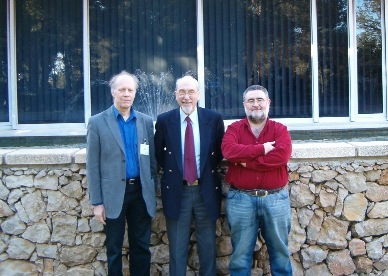Specialist Task Force 325:
Harmonised Relay Services
Who we are:

Team Leader : Walter
Mellors
Team Members : Gunnar Hellström
Juan Calero Gonzalez
What we do :
The STF is funded by EC/EFTA to produce an
ETSI Standard for harmonised relay services. The standard will set out the
requirements for the provision of all kinds of relay services offered in all
networks.
It will identify those new types of text phone services that are IP based and
make recommendations on how they should be handled.
Work started in February 2007 and is steered by TC HF at its regular
meetings. The
fifth draft of
the standard was approved at the meeting of HF 46 in
June.
Following late comment, this version was significantly amended at HF 47
where a
final draft
was approved to go for ETSI members' vote.
The Standard was approved for members' vote at HF 49, and subsequently approved
by members and published in October 2009.
The Technical Report which describes the background work in the preparation of
the standard was completed and published in September 2009.
The STF is grateful to those stakeholders who have contributed to the work of
the STF. All are still invited to contribute information on Relay Services in
their own countries in areas where the report is still incomplete.
A brief
presentation of the aims of the work was made to a joint INCOM-TCAM
eAccessibility subgroup meeting in Brussels in February.
A further
presentation was made to an ETSI Interoperability event in April.
The questionnaire has been given its
first trials with service
providers in the UK
A presentation of the work of the STF
was made by the STF leader at the 21st International Symposium on
Human Factors in Telecommunications (HFT 08) in Kuala Lumpur under the title of
"The harmonisation of relay services in Europe.
At this symposium W Mellors was surprised and gratified to be presented
with the Knut Nordby Design for All accessibility award.
Read our
Terms of
Reference
Why we do it:
Profoundly deaf, deaf-blind and speech-impaired people are
unable to use ordinary telephones and so they are locked out of the voice
telephone network by their inability to hear and/or speak. They have been able
partly to overcome this problem by using text telephones or videophones, but to
achieve the accessibility as desired by the Council Resolution of February 2003
some facility is required to enable them to converse with telephone users who
only have voice telephones.
Such a facility can be provided by a relay service that can
convert between text and speech, normally by means of a human intermediary.
It is also necessary to provide for "spoken to spoken"
relays (which translate from a speech impaired user) and to videophone relays
which can be used by those whose preferred method of communication is by signing.
The work is intended to contribute to the eEurope
2005 action plan in the area of eInclusion and to respond to the policy
objectives set by the European Parliament and Council, aiming at an improved
access for people with disabilities to the information society. Furthermore, the
ETSI Standard (ES) will increase social cohesion and improve e-business
by permitting Small and Medium-sized Enterprises (SMEs) to communicate with
disabled customers.
The provision of this ETSI Standard
(ETSI ES) will assist regulatory authorities in their task to ensure the
harmonized application of the regulatory framework throughout the Community as
called for in Article 1 of Directive 2002/21/EC.
It will provide a tool to enable
regulators to ensure that all citizens have access to a universal service
specified in Directive 2002/22/EC and will also permit them to promote the
interests of the citizens of the European Union by addressing the needs of
disabled users as called for in Article 8.
The standard will assist the
implementation of Directive 2002/22/EC which, in Article 7, requires member
states to take specific measures for disabled users to ensure access to publicly
available telephone services including access to emergency services, directory
enquiry services and directories, equivalent to that enjoyed by other end-users.
The standard will promote innovation by providing a
standard that can be referenced in public procurement processes and so will
enable operators and manufacturers to provide cost effective services and
equipment
Time plan for the work:
The work was completed and the resulting documents were
published the Autumn of 2009.
Deliverables:
The standard ES 202 975 Harmonized Relay Services
http://pda.etsi.org/pda/home.asp?wki_id=lNkJPOugK4EGFEIGZIMDn
The report TR 102 974 Telecommunication Relay Services
http://pda.etsi.org/pda/home.asp?wki_id=r,GN,AfrOGQSXSVR@MWyM
How to contact us:
If you would like more information, please contact the STF
leader: wjmellors@btconnect.com
Note: this information is based upon STF working assumptions.
The views expressed do not necessarily represent the position of ETSI in this
context.
Last updated: 2013-04-13 17:29:17